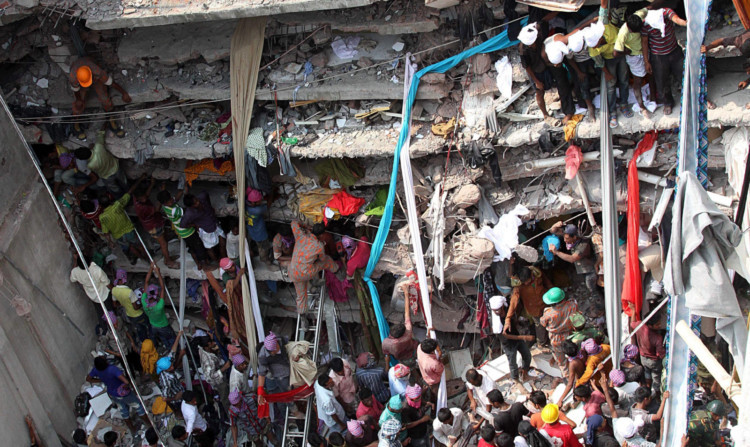
One year after a factory in Bangladesh that made garments for the likes of Primark and Matalan collapsed, victims of the disaster have yet to receive compensation.
The Government is being urged to make the companies involved pay.
And a group of Labour MPs want people to wear their clothes inside out on Thursday to draw attention to the issue of garments that continue to be made in conditions that put workers at risk.
The Rana Plaza building in Dhaka fell down on April 24 last year, killing more than 1,100 people.
Extra storeys had been added illegally and it housed clothing factories, despite not being designed for that task.
Shocked shoppers learned that clothes on sale in a raft of High Street stores were being made in dangerous conditions.
A Labour team of Shadow Consumer Affairs Minister, Stella Creasy, and Shadow International Development Minister, Alison McGovern, have thrown their weight behind the Fashion Revolution campaign looking to use Thursday’s anniversary to raise awareness.
McGovern said: “We’re not telling people not to go shopping. But British shoppers want to feel the clothes they are wearing were made in a safe way and they have the power to put pressure on shops to sign up to basic standards.
“We’re urging people to get curious. Look at the label to see where your clothes are made, use your purchase to support companies that have signed the Bangladesh Safety Accord (BSA), tweet at brands that have not.
“A little bit of pressure can do quite a lot of good.”
The BSA was set up in the wake of the disaster to ensure basic health and safety standards are adhered to in factories there.
The deal also allowed trade unions to operate freely in the factories and, crucially, ensured workers’ rights could be upheld in courts.
More than 100 trade unions have formed in Bangladesh since.
Primark were one of the first to sign up to the new safety standards and have been at the forefront of paying compensation to the victims.
However, Benetton and Matalan are among a list of companies from around the world named and shamed by the global trade union federation, UNI, for not paying into the compensation fund yet.
In the UK the TUC has urged International Development Secretary, Justine Greening, to put pressure on firms to make up the £14 million shortfall in the pot.
McGovern said: “Whilst progress has been made, clearly not enough.
“I would urge all brands to look at their responsibilities and make sure people are properly compensated.”
The International Labour Organisation (ILO) claims 3,000 victims of the disaster will receive compensation, about £400 each or equivalent to a year’s salary, around the anniversary of the collapse.
McGovern, part of Jim Murphy’s Shadow International Development team and a former aide to Gordon Brown, is quick to point out that one of the Coalition Government’s first spending decisions was to end funding to the ILO, the United Nations agency concerned with protecting workers’ rights.
She said: “We can ask questions of how far the Government is committed to these issues.”
Justine Greening claims the Government is working with the ILO to improve conditions in Bangladesh.
The Fashion Revolution campaign aims to use the Rana Plaza anniversary to raise awareness. Their gimmick is urging people to wear their clothes inside out to display the label where the garment was made.
Added McGovern: “People are interested in where their clothes come from. Fairtrade was a niche issue, now it’s mainstream, and you can choose clothes made from Fairtrade cotton.”
Appropriately she uses the example of chocolate, having recently returned from a fact-finding mission to Ghana.
In contrast to a few years ago many Easter eggs opened today will be made of Fairtrade chocolate, ensuring farmers receive a fair price and helping improve conditions in their country.
However isn’t there a danger that the campaign appears as out of touch MPs and environmentalists sneering at those who like to shop in discount stores?
McGovern disagrees. “This shouldn’t cost masses. The only way to do this is if it’s affordable,” she said.
“Primark have been at the front of this and called on others to sign up.” We’re at the start of a journey but it’s undoubtedly a good thing to be able to buy clothes that you know have been made in conditions that respect the dignity of the workers.”

Enjoy the convenience of having The Sunday Post delivered as a digital ePaper straight to your smartphone, tablet or computer.
Subscribe for only £5.49 a month and enjoy all the benefits of the printed paper as a digital replica.
Subscribe